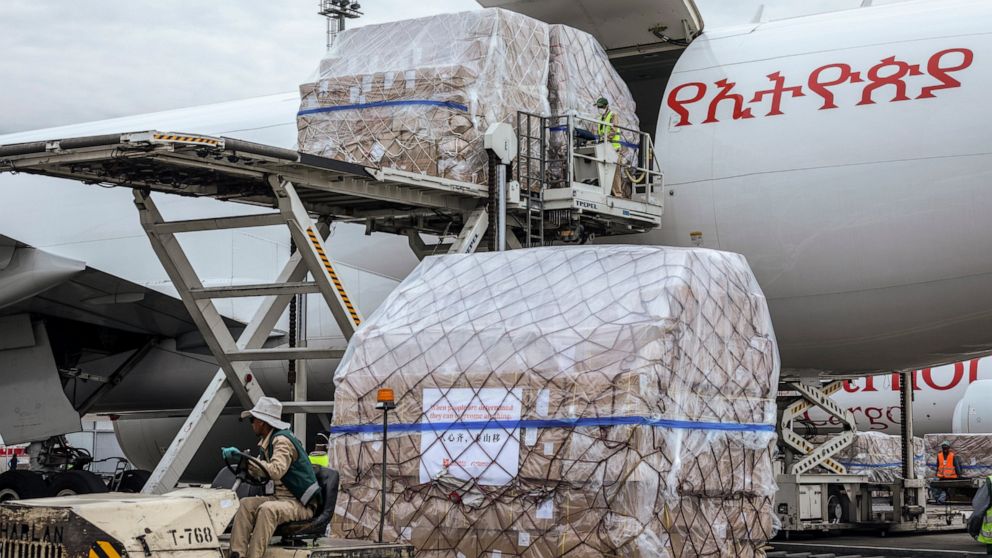[ad_1]
ADDIS ABABA, Ethiopia —
With the coronavirus increasing its spread across Africa, the continent received a much-needed care package from Chinese billionaire Jack Ma.
A cargo flight containing more than 6 million medical items arrived Sunday in Ethiopia’s capital, Addis Ababa. The supplies from Ma, the founder of China’s e-commerce giant Alibaba, will be distributed to African countries in need of supplies to battle the spreading COVID-19 pandemic.
An Ethiopian Airlines cargo flight from Guangzhou, China arrived with 5.4 million face masks, 1.08 million testing kits, 40,000 sets of protective clothing and 60,000 protective face shields, according to Ethiopian officials and the Jack Ma Foundation.
Ethiopian Prime Minister Abiy Ahmed last week pledged to distribute the supplies to other countries in Africa. Ma has sent similar shipments of medical supplies to countries in Asia, Europe, North America and Latin America.
The virus has been relatively slow to reach Africa but has now spread to at least 43 of the continent’s 54 countries, with more than 1,100 cases confirmed. In response many African countries are imposing restrictions.
Mozambique confirmed its first case Sunday and cancelled all visas to the country, closed schools and banned gatherings of more than 50 people.
Kenya announced new restrictions Sunday, after it confirmed eight new cases, bringing its total to 15. It closed all bars and restaurants as of midnight Sunday and halted all services at churches and mosques, saying that houses of worship had not implemented safe social distancing. Kenya also suspended all international passenger flights effective Wednesday and closed the border posts to neighboring Uganda, except for the transport of cargo.
In Burkina Faso, the U.S. ambassador, Andrew Young, announced on his personal Twitter account Sunday that he has tested positive for the virus, He is in quarantine and local sources say he has not gone to a hospital.
Burkina Faso has 75 cases and four deaths as of Sunday, one of the highest number of deaths in sub-Saharan Africa.
Young is the first U.S. ambassador to say that he has tested positive for COVID-19 and the second ambassador in Burkina Faso to contract the virus, according to diplomats. Earlier this week Italian ambassador, Andrea Romussi, told AP he was positive, but was feeling fine. Burkina Faso’s government has also been badly impacted by the virus with at least four Cabinet ministers confirmed as positive.
Burkina Faso’s president on Saturday announced a curfew and shut the borders for two weeks, but health officials are concerned the number of cases will grow exponentially in the coming weeks and could worsen the West African country’s already dire humanitarian crisis.
Almost 800,000 people are internally displaced due to attacks linked to Islamic militants and more than 2 million people are in need of aid.
“The number of high level officials and VIPs who have tested positive is a concern, but I hope that this does not distract from the fact that this virus is indiscriminate in who it will infect,” said Jackie MacLeod, head of mission for the International Rescue Committee in Burkina Faso. “We need to make sure that while this will bring more attention to Burkina Faso, this attention should not have an adverse affect on the humanitarian community’s ability to safely and responsibly deliver aid to people who do not have access to same level of care as Ambassador Young.”
Rwanda and Tunisia have announced lockdowns, ordering people to stay at home except for essential reasons.
Nigeria, Africa’s most populous country with 190 million people, just three weeks ago announced the first coronavirus case in sub-Saharan Africa. Now with 22 cases, it stopped all incoming international flights on Saturday.
Ethiopian Airlines and South African Airways, two of Africa’s largest airlines, announced sweeping cancellations of international flights. South Africa has stopped allowing foreigners to disembark from incoming international flights.
South Africa announced 34 new cases, bringing its total to 274. Normally bustling shopping malls in Johannesburg, Cape Town and other urban centers have few shoppers, many wearing face masks.
Although most people only experience minor flu-like symptoms from the coronavirus and recover within a few weeks, the virus is highly contagious and can be spread by those who do not show symptoms. It can cause severe illness, including pneumonia, in some patients, particularly those with underlying health problems. This poses a threat to many African health systems, which experts warn do not have sufficient resources to cope with a large influx of patients needing isolation and intensive care.
———
Meldrum and AP photographer Denis Farrell contributed from Johannesburg. Sam Mednick in Ouagadougou, Burkina Faso and Tom Bowker in Maputo, Mozambique, also contributed.
———
The Associated Press receives support for health and science coverage from the Howard Hughes Medical Institute’s Department of Science Education. The AP is solely responsible for all content.
———
Follow AP coverage of the virus outbreak at https://apnews.com/VirusOutbreak and https://apnews.com/UnderstandingtheOutbreak.
[ad_2]
Source link

